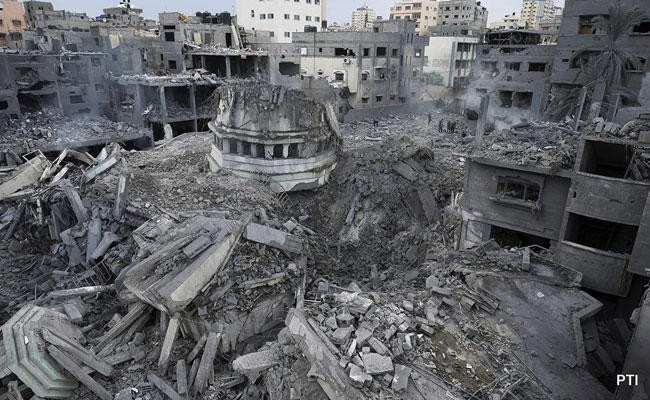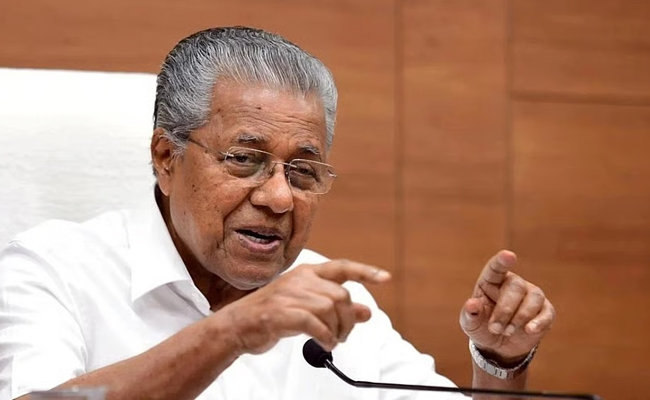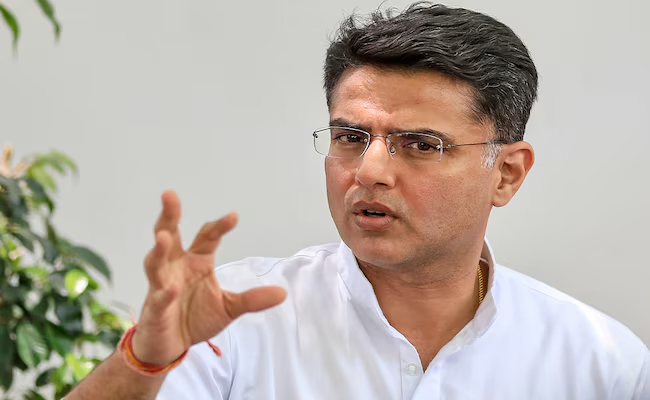Bangkok(AP): World shares fell and oil prices edged lower as investors braced Monday for an expected invasion by Israel in the Gaza Strip.
The futures for the S&P 500 and the Dow industrials edged 0.1% higher. Germany's DAX shed 0.5% to 15,104.87 and the CAC 40 in Paris declined 0.5%, to 6,965.51. Britain's FTSE 100 was down 0.1% at 7,589.92.
Israeli forces, supported by a growing deployment of US warships in the region and the call-up of some 360,000 reservists, have positioned themselves along Gaza's border and drilled for what Israel said would be a broad campaign to dismantle the Hamas.
"Who can blame markets for being jittery," RaboResearch Global Economics and Markets said in a commentary. "The world now holds its breath as Israel prepares for a full-scale ground invasion of Gaza, with only unseasonal torrential rain delaying the seemingly inevitable."
The conflict has jolted oil markets, adding to uncertainties already hanging over the global economic outlook. The Gaza region is not a major producer of oil, but the fear is that the violence could spill into the politics around the crude market and eventually lead to disruptions in the flow of petroleum, with broad ramifications for many industries.
On Friday, the price of a barrel of benchmark US crude oil jumped 4.78 to settle at 87.69. Brent crude, the international standard, climbed 4.89 to 90.89 per barrel. Early Monday, US crude oil was down 17 cents at 87.52 per barrel. Brent gave up 28 cents to 90.61 a barrel.
Worries about the state of the US economy have also undermined recent optimism over the possibility that the Federal Reserve might halt its interest rate hikes aimed at quashing inflation.
Persisting inflationary pressures along with higher oil prices are casting doubts on that, and threatening the "'remarkable resilience' of the US economy, which buoyed stock markets until a few months ago," Stephen Innes of SPI Asset Management said in a report.
In Asian trading Monday, Tokyo's Nikkei 225 sank 2% to 31,659.03 and the Hang Seng in Hong Kong lost 1% to 17,640.36. South Korea's Kospi declined 0.8% to 2,436.24.
The Shanghai Composite index was 0.5% lower, at 3,073.81, while Bangkok's SET skidded 2.1%. Australia's S&P/ASX 200 was down 0.4% at 7,026.50.
On Friday, US stocks mostly fell as they were buffeted by competing waves of optimism and fear.
The S&P 500 slipped 0.5% to 4,327.78 and the Nasdaq composite fell 1.2% to 13,407.23. The Dow industrials edged up 0.1% to 33,670.29.
Worries about the war pulled Treasury yields lower, which often happens when investors head for safer investments during times of stress. The yield on the 10-year Treasury fell to 4.63% from 4.70% late Thursday.
Yields also eased after another official at the Federal Reserve said the central bank may be done hiking its main interest rate following a blistering campaign that began early last year.
Several US banking giants said their profits during the summer were better than feared, which offered hope on Wall Street for an earning reporting season that may deliver the first growth for big companies in a year.
JPMorgan Chase rose 1.5% after its profit for the third quarter climbed 35% from a year earlier. It benefited from a rise in interest rates, but its CEO Jamie Dimon also warned that "this may be the most dangerous time the world has seen in decades".
Wells Fargo rose 3.1% after it likewise topped analysts' expectations for profit during the summer quarter.
UnitedHealth Group beat Wall Street's profit expectations, and its stock climbed 2.6%.
Dollar General jumped to the biggest gain in the S&P 500, up 9.2%, after it said Todd Vasos will be returning as CEO.
In currency dealings early Monday, the US dollar was unchanged at 149.55 yen. The euro rose to 1.0535 from 1.0515.
Let the Truth be known. If you read VB and like VB, please be a VB Supporter and Help us deliver the Truth to one and all.
Thiruvananthapuram (PTI): The Kerala government on Monday assured stringent action in the mob lynching of a Chattisgarh native mistaken to be a thief, and promised justice to the family, even as the ruling CPI(M) targeted the RSS over the assault, a charge denied by the BJP.
Ramnarayan (31), was allegedly beaten to death on Wednesday after being accused of involvement in theft at Kizhakeattappallam near Walayar in Palakkad district.
With the issue sending shock waves across the state, Chief Minister Pinarayi Vijayan on Monday described the incident as "deeply disturbing".
Assuring justice to his family, who have arrived in the state, Vijayan said such acts tarnish the reputation of a progressive society like Kerala and are completely unacceptable.
State minister M B Rajesh claimed racial slurs were made at the victim and that the attackers were RSS workers. Ruling CPI (M) state secretary M V Govindan also alleged that RSS-BJP workers were behind the crime.
ALSO READ: After Hadi, another Bangladesh student leader shot in head
In a statement issued by the CM's office, Vijayan said strict action would be taken against those responsible for the crime.
A special investigation team of the district police is probing the incident, he said, adding that instructions have been issued to thoroughly examine the details of the case and initiate all necessary legal proceedings.
The government will also review the matter and ensure appropriate compensation to the victim's family, Vijayan added.
He called for collective vigilance to prevent the recurrence of such incidents in the future.
His remarks came a day after opposition Congress and the victim's family demanded compensation and an investigation under stringent laws, including the SC/ST (Prevention of Atrocities) Act.
The brother of deceased man told reporters on Sunday that the family would not accept the body until their demands, including compensation of Rs 25 lakh, are met.
Kerala ministers K Rajan and Rajesh strongly condemned the incident and said it was not just a mob lynching case but racial abuse was involved in it.
The ministers said the accused had attacked the deceased man, calling him a "Bangladeshi" and beat him to death.
"The government will ensure a foolproof probe into the incident, and no one involved in the crime will be spared," Revenue Minister Rajan told reporters in Thrissur.
He said an amount not less than Rs 10 lakh would be granted from the Chief Minister's Distress Relief Fund (CMDRF) to the deceased man's family and a cabinet meeting would take a decision in this regard.
LSGD Minister Rajesh also said Ramnarayan was branded as a Bangladeshi by the attackers.
While talking to reporters in Palakkad, he alleged that those who brutally assaulted and killed Ramnarayan were RSS workers.
The Chhattisgarh native, who reached Kerala in search of a job, became a victim of the "divisive politics" of Sangh Parivar, Rajesh further alleged.
"Branding a person as Bangladeshi came from racial politics. Ramnarayan was a victim of the racial poison spread by the Sangh Parivar in the country," he charged.
Rajesh also accused a section of the media of hiding the involvement of the RSS in the assault.
Stepping up the attack against the right-wing groups, CPI (M) state secretary M V Govindan alleged that RSS-BJP workers were the ones behind the crime.
"Those involved in the incident were accused in various criminal cases of RSS. All of them were identified. Such cruelties should not be allowed to repeat in the state," he said.
Expressing strong protest, the senior leader further said a society which believes in democratic values and secular principles cannot accept such crimes.
Senior BJP leader Kummanam Rajasekharan strongly rejected the charges against the saffron party and the RSS.
"Actually, why is politics mixed in such crimes. When a heinous crime like mob lynching happens, should it not be treated as an anti-social act," he told reporters here.
Leader of Opposition in the state Assembly, V D Satheesan urged the government to take urgent steps to provide financial assistance to the family of Ramnarayan.
Meanwhile, Palakkad Superintendent of Police Ajit Kumar said at present, the case was registered under sections of murder, and after a detailed probe, more would be added.
After verifying the caste certificate of the deceased man, SC/ST (Prevention of Atrocities) Act would also be invoked, he told reporters in Palakkad.
A 10-member Special Investigation Team (SIT) has been formed under the DSP (district crime branch) to probe the mob lynching incident. The SIT will be under the direction and supervision of the Pakakkad SP, he added.
ALSO READ: 17-year-old PUC student in Shivamogga drowns while swimming in River Tunga
When reporters asked about the political background of the accused persons, the officer said it was being verified.
He said that the arrested persons were already facing police cases.
Five people have been arrested so far for allegedly beating Ramnarayan to death on suspicion of theft.
The injured man was rushed to the Palakkad District Government Hospital, where he later succumbed to his injuries.





